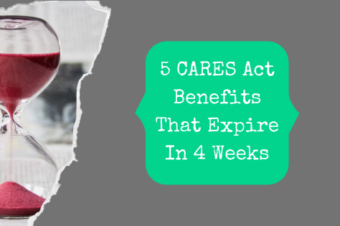
Clergy and religious workers are now eligible for Public Service Loan Forgiveness (PSLF) based on their religious work. To be eligible, the loans must still be direct, 120 payments must be made, and the borrower must work for a qualifying employer.
Yes! After over a decade of exclusion, clergy and religious workers are now eligible for Public Service Loan Forgiveness (PSLF)! When the program first started in 2007, religious work was not considered qualifying work. However, that all changed on July 1, 2021.
New regulations were created by the last Education Secretary, who believed that such an exclusion violated the Establishment Clause of the U.S. Constitution. Now, there is no religious exclusion, which is excellent news for pastors. For ministers that may be carrying around debt from both an undergraduate degree and Master of Divinity, this could very well be an answer to prayer.
What Is Public Service Loan Forgiveness?
You’ve probably heard talk of the student loan crisis. In fact, you may be living it. Americans owe over $1.5 trillion in student debt. In response to this crippling debt load, the federal government initiated a student loan forgiveness program back in 2007 for those working in public service. It is called Public Service Loan Forgiveness and commonly goes by the acronym PSLF.
Not everyone is eligible for PSLF. Eligibility requires that 120 payments are made, the loans themselves are Direct government loans being paid on an income-driven repayment plan, and that the borrower works for a qualified employer. Let me break each of those down for you.
If you make 120 qualifying monthly payments under a qualifying repayment plan while doing qualifying work for a qualifying employer, then you can submit an application to have your student loans forgiven. You must still be working for that qualifying employer when you submit the application and when the loan is actually forgiven. Since that’s a lot of qualifying going on, let’s break it down to see what “qualifying” actually means:
120 Monthly Payments
To qualify, monthly payments must be made after October 1, 2007. Payments must be for the full amount due as shown on the bill and paid no more than 15 days after the due date. Only payments made while you are employed full-time by a qualifying employer are eligible. Normally, if you made payments when you weren’t required to, such as while you were in school, during a grace period, or under a deferment or forbearance, they do not qualify towards the PSLF. Qualifying payments do not have to be consecutive, but there do have to be 120—you can’t speed the process by paying extra.
One thing to note: borrowers get credit for making payments during the government-mandated forbearance in response to the coronavirus pandemic even if they are not making payments. The last 17 months have been like a free pass where you get credit without having to pay. All you have to do is submit a PSLF form certifying your employment for the same period of time as the suspension so that they will update your official count of qualifying payments.
Direct Loans
Not all student loans are eligible for PSLF. Only Direct loans are. That means Direct Subsidized Loans, Direct Unsubsidized Loans, Direct PLUS loans, and Direct Consolidation loans. With Direct Consolidation loans, it’s important to know that the 120 payments start with the new consolidated loan, previous payments on the individual loans do not count.
The fact that Direct PLUS loans are eligible means that students themselves are not the only ones eligible for PSLF. Parents who take out PLUS loans to put their children through college are also eligible for PSLF. PSLF eligibility is based on the borrower, meaning that it is the parent who must qualify in the case of Parent PLUS loans. That means if you take out $300,000 in loans to send your child to law school, you could have them forgiven based on your work at the church, regardless of where your child ends up working or how much they make.
Repayment Plan
Eligible repayment plans for the PSLF are the 10-Year Standard Repayment Plan and all of the income-driven repayment plans: Pay As You Earn (PAYE), Revised Pay As You Earn (REPAYE), Income-Based Repayment (IBR), and Income-Contingent Repayment (ICR).
While the 10-Year Standard Repayment Plan qualifies, if you don’t end up switching to an income-driven repayment plan it will be pointless because your loan will be paid off in 10 years anyway. The Standard Repayment Plan for Direct Consolidation Loans does not qualify for the PSLF.
Employer
It is your employer, and not your actual job, that qualifies you for PSLF. Any level of government organization (federal, state, local, or tribal), Americorp, Peace Corp, tax-exempt nonprofit 501(c)(3) organizations, and non-tax-exempt nonprofits that provide certain qualifying public services are all eligible. Most churches and parachurch organizations in the U.S. are 501(c)(3) organizations, making them qualifying employers. This doesn’t only apply to pastors, your church janitor is just as eligible as you are because you both work for the right kind of employer. In addition, you must still be working for that qualifying employer when you submit the application and when the loan is actually forgiven.
Things To Be Aware Of
The PSLF can be very appealing, especially for those of you with six-figure student debt. However, there are a few things you should watch out for. First of all, there is no guarantee that the program will continue in the future. The government could end or alter the program at any time as they do with so many other things.
Even if you’re planning on having your loans forgiven, you should always have a Plan B. In 2017, the first round of applicants was greatly disappointed because most of them did not have their loans forgiven. Granted, in most cases, it was because they were not eligible and had been making plans based on bad information. There was public outrage, but it just goes to show that you should double-check your information, especially things you find online (yes, even this blog!), and it’s always best to work with a knowledgeable professional. To ensure eligibility, make sure to fill out the Employment Certification form each year and double-check that everything else lines up. Make sure to keep all of your records as well.
If you think you might be eligible for student loan forgiveness and want to know what the PSLF can do for you, check out this online calculator. Even if you aren’t eligible, it’s important to come up with a plan for paying off your debt and structure your lifestyle to enable you to do so. Pastors don’t often have a lot of margin in their budgets so it can take a while, but God will be with you every step of the way. Just think of poor Jacob, working 14 years just to get the wife he wanted. If he could do it, so can you!




6 Responses
Chris
December 3, 2018Excellent article, Amy! Thanks!
Amy
December 12, 2018You’re welcome!
Woodler Alezy
July 26, 2021Thank you Amy for sharing.
Amy
July 28, 2021I’m glad you found it useful, Woodler.
Sean
June 8, 2022Do you know what to check off for the question “Which of the following services does your employer provide? I didn’t see anything that pertained to a church.